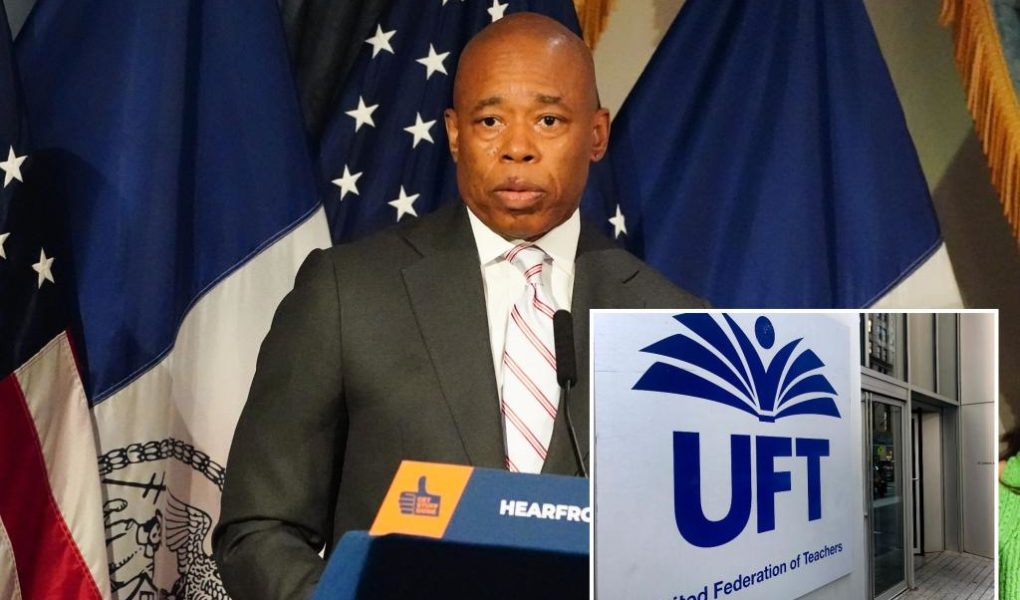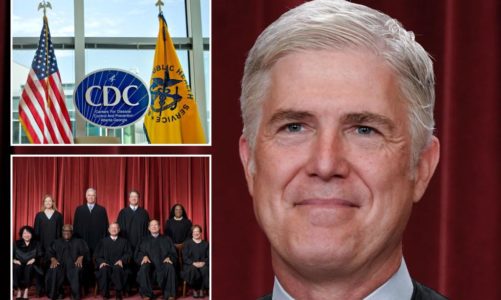Retired city workers are understandably upset the city is changing their health insurance, forcing them into a plan with less flexibility effective September.
But they shouldn’t be surprised: Something had to give.
Our retirees are getting off easy — so far.
Mayor Eric Adams registered the new contract last week with healthcare provider Aetna to start administering the less-generous Medicare contract in the fall, overriding Comptroller Brad Lander’s objections.
Thanks to a higher federal subsidy for the new Advantage plan, as well as stricter rules for specialty visits and the like, the city expects to save $600 million a year.
Retirees don’t like this.
But they can’t fault Adams.
They can blame their union leadership: Two years ago, the Municipal Labor Committee, an umbrella of union leaders, agreed with then-Mayor Bill de Blasio to make the switch, as part of a longstanding commitment to cut healthcare costs.

The teachers union dominated the leaders’ vote.
Why? Realism: Even that union understands money is not infinite, and it needs to help find savings somewhere to fund raises for current workers.
Days before Adams registered the new retiree healthcare plan, the city and the United Federation of Teachers announced “substantial raises.”
Teachers will get 17% hikes over five years and a one-time $3,000 bonus, plus annual bonuses that reach $1,000 in 2026.

The minimum salary for a first-year teacher will go up more than $10,000, to $73,349; after eight years, rather than 15, all teachers will earn six figures.
The raises are not the problem.
They’re the best the city can do in an environment of high inflation.
But the teachers’ contract marks the biggest deal Adams has done with nearly all the city’s labor unions, including the police.
Most include substantial increases to starting pay, plus bonuses, with no givebacks in terms of extra work required or extra accountability for performance in return.
The agreements are expensive.
The city has added $16 billion to the budget over five years to pay for them. This year, the extra cost is $1.7 billion; by 2027, it will be $4.8 billion.
At the same time, the city expects to spend $4.3 billion more on migrants by the end of next year — a challenge the mayor himself created by attempting to do the impossible: be the only city on Earth that provides shelter on demand to the entire world.
Thanks to new labor deals and “asylee” costs, Adams isn’t even close to inking a budget deal for the fiscal year 2024 with the City Council by next week’s end-of-June deadline.
The council and mayor can’t agree on offsetting cuts to the $108.3 billion blueprint.

And the projected deficit for next summer has grown from $3.2 billion to $4.2 billion. Add another billion to that, if migrant costs continue to soar.
Such deficits were manageable when the city’s commercial-property tax base was consistently growing and Wall Street was booming.
But financial firms from Citigroup to Goldman Sachs are laying off thousands, and offices overall remain half empty, meaning big write-offs in value.
There isn’t room to raise taxes: Gov. Kathy Hochul just boosted taxes on New York City businesses by $1.1 billion a year, for the Metropolitan Transportation Authority.
Next year, she’s set to implement the billion-a-year-levy congestion-pricing program.
Both are massive hikes to doing business.
Current city-government employees may not be worried about their predecessors’ plight in retirement — they prefer their own raises and don’t appear to have much sympathy for a generation that had a much easier time amassing home equity and paying for children’s education.
And the new Medicare plan is not that bad, considering that private-sector retirees don’t have any former employer to fund their health care.
They pay for Medicare on their own, and people who retire before age 65 find their own health insurance.

But current workers, too, should consider the ease with which the city downgraded retirees’ healthcare plan.
Unlike pensions, the state constitution doesn’t guarantee any retiree health care.
Because the benefits are not subject to a constitutional guarantee, the city hasn’t bothered putting much money behind its healthcare promises — it’s amassed a $90 billion gap between what it’s pledged and what it’s saved up to pay these future costs.
The only thing that stands between city retirees and no taxpayer-funded health care is a city law, easily amended in a budget crisis — and union leadership.
Union members would be prudent to observe who their leaders — and implicitly the city workers themselves — chose this time.
Nicole Gelinas is a contributing editor to the Manhattan Institute’s City Journal.
𝗖𝗿𝗲𝗱𝗶𝘁𝘀, 𝗖𝗼𝗽𝘆𝗿𝗶𝗴𝗵𝘁 & 𝗖𝗼𝘂𝗿𝘁𝗲𝘀𝘆: nypost.com
𝗙𝗼𝗿 𝗮𝗻𝘆 𝗰𝗼𝗺𝗽𝗹𝗮𝗶𝗻𝘁𝘀 𝗿𝗲𝗴𝗮𝗿𝗱𝗶𝗻𝗴 𝗗𝗠𝗖𝗔,
𝗣𝗹𝗲𝗮𝘀𝗲 𝘀𝗲𝗻𝗱 𝘂𝘀 𝗮𝗻 𝗲𝗺𝗮𝗶𝗹 𝗮𝘁 dmca@enspirers.com




